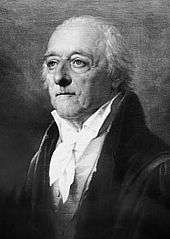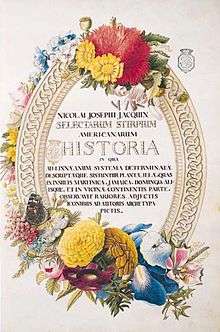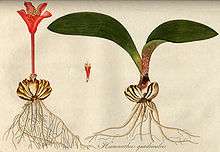Nikolaus Joseph von Jacquin



Nikolaus Joseph Freiherr von Jacquin[1] or Baron Nikolaus von Jacquin (16 February 1727 – 26 October 1817) was a scientist who studied medicine, chemistry and botany.
Born at Leiden in the Netherlands, he studied medicine at Leiden University, then moved first to Paris and afterward to Vienna.
Between 1755 and 1759, Nikolaus von Jacquin was sent to the West Indies and Central America by Francis I to collect plants for the Schönbrunn Palace, and amassed a large collection of animal, plant and mineral samples.
In 1763, Nikolaus von Jacquin became Professor of Chemistry and Mineralogy in Schemnitz (now Banská Štiavnica in Slovakia). In 1768, he was appointed Professor of Botany and Chemistry and became director of the botanical gardens of the University of Vienna. For his work, he was knighted in 1774. In 1783, he was elected a foreign member of the Royal Swedish Academy of Sciences. In 1806, he was created a baron. In 1809, he became a correspondent of the Royal Institute, which later became the Royal Netherlands Academy of Arts and Sciences.[2]
His younger son, Emil Gottfried (1767–1792), and his daughter, Franziska (1769–1850), were friends of Mozart; Mozart wrote two songs for Gottfried to publish under Gottfried's name (K. 520 Als Luise … and K. 530 Das Traumbild) and gave piano lessons to Franziska. Mozart dedicated a considerable number of his works to the Jacquin family, notably the Kegelstatt Trio. This was first played at the Jacquins' house in August 1786 with Franziska playing the piano.
His son Joseph Franz (1766–1839) succeeded him as professor of botany and chemistry at the University of Vienna and wrote several notable botanical books.
Von Jacquin died in Vienna.
He is commemorated by the genera Jacquinia (Theophrastaceae) and Jacquiniella (Orchidaceae). In 2011, the Austrian Mint issued silver coins to mark his science expeditions to the Caribbean.[3]
Publications
- Enumeratio systematica plantarum (1760)[5]
- Enumeratio Stirpium Plerarumque (1762)
- Selectarum Stirpium Americanarum (1763)[6]
- Observationum Botanicarum (part 1 1764, part 2 1767, part 3 1768, part 4 1771)
- Hortus Botanicus Vindobonensis (3 volumes, 1770–1776) with plates by Franz Anton von Scheidel[7]
- Florae Austriacae (5 volumes, 1773–1778)[8]
- Icones Plantarum Rariorum (3 volumes, 1781–1793)[9]
- Plantarum Rariorum Horti Caesarei Schoenbrunnensis (4 volumes, 1797–1804)[10]
- Fragmenta Botanica 1804–1809 (1809)[11]
- Nicolai Josephi Jacquin collectaneorum supplementum ...
- Oxalis :Monographia iconibus illustrata
- Dreyhundert auserlesene amerikanische Gewächse nach linneischer Ordnung (with Zorn, Johannes)
- Nikolaus Joseph Edlen von Jacquin's Anfangsgründe der medicinisch-practischen Chymie : zum Gebrauche seiner Vorlesungen . Wappler, Wien 1783 Digital edition by the University and State Library Düsseldorf
- Nikolaus Joseph Edlen von Jacquin's Anfangsgründe der medicinisch-practischen Chymie : zum Gebrauche seiner Vorlesungen . Wappler, Wien 2. Aufl. 1785 Digital edition by the University and State Library Düsseldorf
Notes
- ↑ Regarding personal names: Freiherr is a former title (translated as Baron). In Germany since 1919, it forms part of family names. The feminine forms are Freifrau and Freiin.
- ↑ "Nikolaus Joseph von Jacquin (1727–1817)". Royal Netherlands Academy of Arts and Sciences. Retrieved 19 July 2015.
- ↑ "Austrian Mint Issues Nikolaus Joseph von Jacquin 20€ Silver Coin". Coin Update News. Retrieved 8 March 2011.
- ↑ IPNI. Jacq.
- ↑ Joseph,, Jacquin, Nikolaus (4 June 1760). "Enumeratio systematica plantarum".
- ↑ "Selectarum stirpium Americanarum historia, in qua ad Linnaeanum systema determinatae descriptaeque sistuntur plantae illae, quas in insulis Martinica, Jamaica, Domingo aliisque et in vicinae continentis parte, observavit rariores; adjectis iconibus ad autoris archetypa pictis :: Latin American plant literature". mertzdigital.nybg.org.
- ↑ "Details - Hortus botanicus vindobonensis, seu, Plantarum rariorum, quae in Horto botanico vindobonensi ... :coluntur, icones coloratae et succinctae descriptiones / - Biodiversity Heritage Library". www.biodiversitylibrary.org.
- ↑ "Details - Florae Austriacae, sive, Plantarum selectarum in Austriae archiducatu :sponte crescentium icones, ad vivum coloratae, et descriptionibus, ac synonymis illustratae / - Biodiversity Heritage Library". www.biodiversitylibrary.org.
- ↑ "Details - Icones plantarum rariorum / - Biodiversity Heritage Library". www.biodiversitylibrary.org.
- ↑ "Details - Plantarum rariorum horti caesarei Schoenbrunnensis descriptiones et icones / - Biodiversity Heritage Library". www.biodiversitylibrary.org.
- ↑ Joseph,, Jacquin, Nikolaus; Schmidt., Mathiae Andreae. "Fragmenta botanica, figuris coloratis illustrata".
External links
![]()